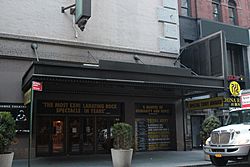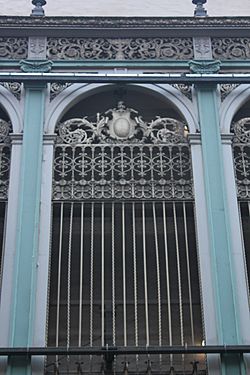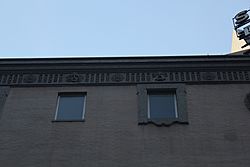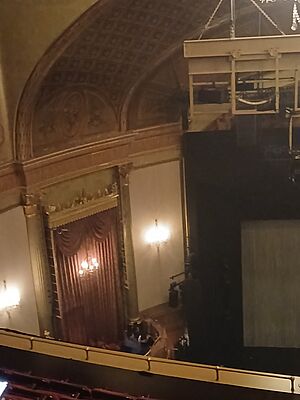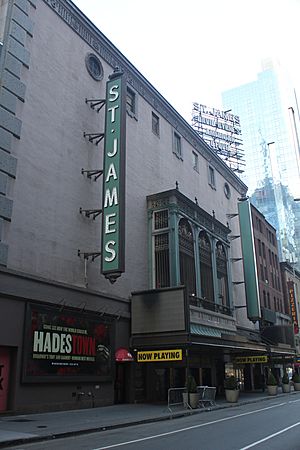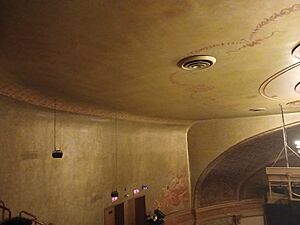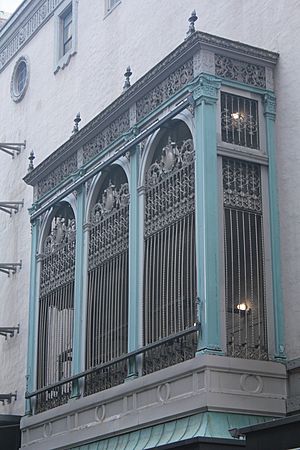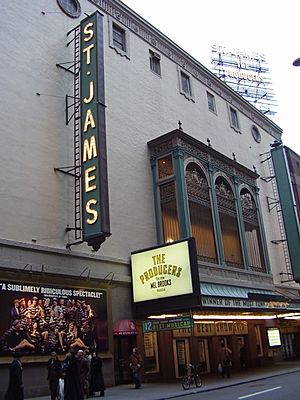St. James Theatre facts for kids
|
Erlanger's Theatre
|
|
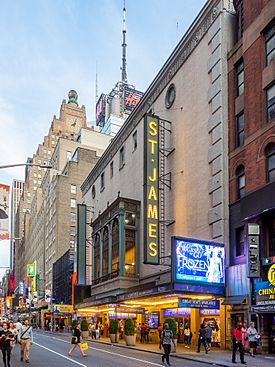
St. James Theatre in July 2019
|
|
| Address | 246 West 44th Street Manhattan, New York United States |
|---|---|
| Coordinates | 40°45′29″N 73°59′17″W / 40.75806°N 73.98806°W |
| Owner | ATG Entertainment |
| Type | Broadway |
| Capacity | 1,684–1,709 |
| Construction | |
| Opened | September 26, 1927 |
| Architect | Warren and Wetmore |
| Designated | December 15, 1987 |
| Reference no. | 1374 |
| Designated entity | Facade |
| Designated | December 15, 1987 |
| Reference no. | 1375 |
| Designated entity | Auditorium interior |
The St. James Theatre is a famous Broadway theater in New York City. It is located at 246 West 44th Street in the busy Theater District of Midtown Manhattan. The theater first opened in 1927. It was designed by a company called Warren and Wetmore in a style that looked like old Georgian buildings. It was built for a man named A. L. Erlanger, and was first called Erlanger's Theatre.
The St. James Theatre can hold up to 1,709 people across three levels. Today, it is run by ATG Entertainment. Both the outside (facade) and the inside (auditorium) of the theater are protected as important New York City landmarks. Over the years, it has hosted many popular musicals. These include original shows like Oklahoma!, The King and I, Hello, Dolly!, The Who's Tommy, and The Producers.
Contents
Where Is the St. James Theatre?
The St. James Theatre is at 246 West 44th Street. It sits on the south side of the street, between Eighth Avenue and Seventh Avenue. This area is very close to Times Square in the Theater District of Midtown Manhattan, New York City.
The theater building is almost a rectangle. It covers about 12,858 square feet (1,194.5 square meters). It has a front side of about 124.5 feet (37.9 meters) on 44th Street. The St. James Theatre is surrounded by other famous buildings. These include the Hayes Theater, Sardi's restaurant, and other theaters like the Majestic and Broadhurst. Before the St. James was built, this spot had several old three-story houses. Even the original Sardi's restaurant was torn down to make space for the theater.
How the Theater Was Designed
The St. James Theatre was designed by Warren and Wetmore. They used a style called Georgian Revival style, which mixes in some Beaux-Arts ideas. It was built for producer Abraham L. Erlanger and opened in 1927. The building was constructed by the Thompson–Starrett Co.. Today, the St. James is operated by Jujamcyn Theaters.
The Outside Look
The outside of the theater, called the facade, is designed to be balanced. It is wider than it is tall. The facade looks quite simple. It is mostly made of stucco, which is a type of plaster. The bottom part is covered in cast stone, which looks like stone, above a granite base.
The ground floor has many doors. On the far right (when looking at the front) is a metal stage door. Next to it is the entrance to the box office lobby. This entrance has three glass doors. Above them is a window with signs. In the middle of the ground floor are four metal doors that lead into the main seating area. On the left side, there is a glass door for the offices upstairs.
Above the western and central parts of the facade are two large signs called marquees. These signs face both west and east. The upper parts of the facade have decorative corner pieces. In the center, there is a two-story open balcony, called a loggia, made of wrought iron. This loggia hides the fire escape. It has three arches with fancy iron grilles and decorations. On each side of the loggia, there are tall signs with "St. James" written on them.
The very top part of the building, the attic, has five rectangular windows and two round windows. These windows have decorative frames. Above the windows, there is a decorative band with round flower designs and masks that look like comedy and tragedy faces. The very top edge of the building is a simple cornice.
Inside the Auditorium
The main seating area, called the auditorium, has a lower level (orchestra), two upper levels (balconies), special box seats, and a stage. The inside is decorated with plaster designs and paintings that look like carvings. The theater has between 1,684 and 1,709 seats. When it first opened, it had 1,600 seats, which was a lot for a musical theater back then. Having two balconies was also unusual for theaters at that time.
The St. James's interior was designed to be simpler than other Broadway theaters. It didn't have as much fancy plasterwork. Instead, the designers focused on the layout and colors. Originally, the theater had coral-colored walls with gold accents. After a renovation in 1958, the inside was decorated in charcoal gray and gold.
Seating Areas
The orchestra level is the lowest seating area. It is accessible for wheelchairs through the main doors. This level slopes down towards the stage. There is a pit in front of the stage for the orchestra, which can hold 40 musicians.
The balcony levels are reached by stairs. The first balcony, also called the mezzanine, slopes down and is divided into front and back sections. This balcony is deeper than in many other theaters. The second balcony also slopes but is set back further. The front of the mezzanine is curved and has decorative designs. It connects to the special box seats on each side. The undersides of the balconies are simple plaster.
On each side of the stage, there is a curved wall with one box seat area on the mezzanine level. These box seats have fancy plaster moldings. Next to each box are decorative columns that support the structure above. There are also oval spaces on the walls in front of each box, which hold sculptures of women. Above the boxes, there are curved spaces with murals.
Other Design Features
Next to the box seats is the proscenium arch, which frames the stage. It has a flat-arched opening with a curved arch around it. A mural is painted above the stage opening. It shows cupids playing golf and Satan in a "ruined temple of love." The original stage curtain was made of asbestos and had designs of court jesters.
A curved sounding board is above the stage, in front of the proscenium arch. It has molded designs of leaves and ribbons. The ceiling itself is flat and has a decorative centerpiece with musical instruments and hanging decorations. A chandelier hangs from the center. This centerpiece is surrounded by grilles that were originally for ventilation.
Other Inside Areas
The lobby is located to the west of the orchestra seating area. It has an outer and inner section, with the box office in the outer part. The inner lobby originally had a large tapestry and a marble table. It had black and white marble floors and gray stone walls with black and gold marble decorations. A gray marble staircase led to the auditorium. The lobby was made larger and changed during a renovation in 1958.
The theater also had a ladies' lounge in the basement and a men's lounge on the mezzanine. The ladies' lounge had a rose and gold color scheme. The mezzanine lounge was gray-green and lit by hidden lamps. There was also a men's club room in the basement, decorated in a Tudor style with a fireplace.
Backstage, there are dressing rooms for up to 150 performers. The main stars had their own special suites. Musicians had their own area connected to the orchestra pit. The main offices for Jujamcyn Theaters are also in the St. James Theatre building.
History of the St. James Theatre
The Times Square area became the main place for big theater shows between 1900 and the Great Depression. A. L. Erlanger, who built the St. James, was a very important person in theater at that time.
How It Was Built and Its Early Years
Erlanger first thought about building a new theater in New York City in 1921. He hired Warren and Wetmore to design a 1,200-seat theater on 44th Street. This theater was first called the Model Theatre. But his plans were delayed because of disagreements with other theater groups.
Finally, in February 1926, Erlanger announced his third plan: a 1,600-seat theater with two balconies, which would cost $1 million. This was Erlanger's Theatre. It was similar in size to the New Amsterdam Theatre. Warren and Wetmore were still the architects.
The theater was ready by May 1927. It officially opened on September 26, 1927, with a musical called The Merry Malones. This show ran for 192 performances. Erlanger took full control of the theater a month after it opened. After Erlanger died in 1930, his family continued to run the theater for a while.
Vroom Takes Over
In July 1932, Lodewick Vroom bought the theater. Soon after, he renamed it the St. James, after a famous theater in London. The first show at the newly named St. James was Walk a Little Faster in December 1932. It ran for 121 performances.
The St. James hosted many different types of shows in the 1930s. These included more Gilbert and Sullivan operas and performances by the Ballets Russes de Monte-Carlo. Famous actors like John Gielgud and Maurice Evans performed in Shakespeare plays like Hamlet and Richard II. In 1938, an uncut version of Hamlet was performed there, which was the first time the full play was shown in the U.S.
The Shubert Family's Time
The Shubert Organization started running the St. James in July 1941. In March 1943, the famous musical Oklahoma! by Rodgers and Hammerstein premiered at the St. James. It was a huge success, running for over 2,200 performances until 1948. This show helped save the Theater Guild from financial trouble and became a classic.
In 1948, Where's Charley? opened, running for 762 performances. Then came Peter Pan and more Gilbert and Sullivan shows. In 1951, another Rodgers and Hammerstein hit, The King and I, premiered and ran for 1,246 performances. The Pajama Game opened in 1954, running for 1,061 performances.
In the 1950s, the Shubert family owned almost half of all the theaters in New York City. The U.S. government took them to court because of this. As a result, the Shuberts had to sell some of their theaters. In 1956, William L. McKnight bought the St. James Theatre.
Jujamcyn Takes Over
William L. McKnight spent $600,000 to renovate the St. James in 1958. The inside was changed a lot, but the outside stayed mostly the same. The interior was redecorated in gold and charcoal gray. New curtains, carpets, and seats were added. The first show after the renovation was Flower Drum Song in December 1958.
1960s to 1970s
The St. James continued to host many popular shows. In 1960, Once Upon a Mattress with Carol Burnett transferred there. In 1964, the musical Hello, Dolly! opened, starring Carol Channing. This show was a massive hit, running for 2,844 performances until 1970. It was the longest-running Broadway musical at the time.
In 1976, McKnight transferred the St. James and other theaters to his daughter Virginia and her husband James H. Binger. The theater hosted a revival of My Fair Lady and the musical On the Twentieth Century, which ran for over 450 performances.
1980s and 1990s
The musical Barnum premiered in 1980, running for 854 performances. In 1983, My One and Only opened and ran for 767 performances. In 1985, Jujamcyn spent $1.5 million to renovate the theater again. They added a new marquee, seats, and carpets, and repainted the auditorium.
In 1987, the St. James's outside and inside were officially named New York City landmarks. This meant they were protected and couldn't be changed too much. The musical The Secret Garden opened in 1991, running for 706 performances. This was followed by The Who's Tommy in 1993, which ran for 900 performances. In 1999, the St. James had another $3 million renovation.
2000s to Present
In 2001, Mel Brooks's musical The Producers opened at the St. James. It broke ticket-sale records and was incredibly popular. It ran until 2007, with 2,502 performances. After James H. Binger died in 2004, Rocco Landesman bought the St. James and Jujamcyn's other theaters in 2005.
In the early 2010s, the St. James hosted many musicals and concerts. These included American Idiot (2010), Hair (2011), and Frozen (2018). Frozen set a new box office record for the St. James Theatre in December 2018.
All Broadway theaters closed on March 12, 2020, because of the COVID-19 pandemic. Frozen was canceled. The St. James was the first Broadway theater to reopen after the pandemic closure. It hosted Bruce Springsteen's Springsteen on Broadway shows starting on June 26, 2021.
In 2023, Jujamcyn and Ambassador Theatre Group (ATG) decided to combine their companies. This means they now operate seven Broadway theaters, including the St. James. In July 2023, Jordan Roth sold most of his share in Jujamcyn's theaters to ATG.
Recently, the St. James has hosted musicals like New York, New York (2023), Spamalot (2023), and Illinoise (2024). The musical Sunset Boulevard transferred to the theater in October 2024 and is scheduled to run until July 2025. A new musical, The Queen of Versailles, is scheduled to open in November 2025.
Famous Shows at the St. James Theatre
Here are some of the notable productions that have played at the St. James Theatre, listed by their opening year.
From the 1920s to the 1990s
| Opening year | Name | Refs. |
|---|---|---|
| 1928 | She Stoops to Conquer | |
| 1928 | Diplomacy | |
| 1928 | Billie | |
| 1930 | The Rivals | |
| 1930 | Fine and Dandy | |
| 1931 | Gilbert and Sullivan Series (eight unique productions) | |
| 1931 | The Merry Widow | |
| 1931 | The Chocolate Soldier | |
| 1931 | The Geisha | |
| 1931 | The Chimes of Normandy | |
| 1931 | Naughty Marietta | |
| 1931 | The Firefly | |
| 1932 | The Gondoliers | |
| 1932 | Robin Hood | |
| 1932 | Walk a Little Faster | |
| 1933 | Gilbert and Sullivan Series (five productions) | |
| 1933 | Ballet Russe de Monte-Carlo | |
| 1934 | The Chocolate Soldier | |
| 1934 | Thumbs Up! | |
| 1935 | May Wine | |
| 1936 | Love from a Stranger | |
| 1937 | Richard II | |
| 1937 | Father Malachy's Miracle | |
| 1938 | Hamlet | |
| 1939 | King Henry IV, Part 1 | |
| 1940 | Earl Carroll's Vanities (1940) | |
| 1940 | Twelfth Night | |
| 1941 | Native Son | |
| 1941 | Pal Joey | |
| 1942 | Gilbert and Sullivan Series (ten productions) | |
| 1942 | Claudia | |
| 1942 | Without Love | |
| 1943 | Oklahoma! | |
| 1948 | Where's Charley? | |
| 1950 | Peter Pan | |
| 1951 | Gilbert and Sullivan Series (six productions) | |
| 1951 | The King and I | |
| 1954 | The Pajama Game | |
| 1956 | Li'l Abner | |
| 1958 | Flower Drum Song | |
| 1960 | Once Upon a Mattress | |
| 1960 | Becket | |
| 1960 | Do Re Mi | |
| 1961 | Subways Are for Sleeping | |
| 1962 | Mr. President | |
| 1963 | Luther | |
| 1964 | Hello, Dolly! | |
| 1970 | 1776 | |
| 1971 | Two Gentlemen of Verona | |
| 1973 | A Streetcar Named Desire | |
| 1974 | Good News | |
| 1975 | The Misanthrope | |
| 1976 | My Fair Lady | |
| 1976 | Music Is | |
| 1977 | Vieux Carré | |
| 1978 | On the Twentieth Century | |
| 1979 | Carmelina | |
| 1979 | The 1940's Radio Hour | |
| 1980 | Filumena | |
| 1980 | Barnum | |
| 1982 | Rock 'N Roll! The First 5,000 Years | |
| 1983 | My One and Only | |
| 1985 | Jerry's Girls | |
| 1987 | 42nd Street | |
| 1989 | Gypsy | |
| 1991 | The Secret Garden | |
| 1993 | The Who's Tommy | |
| 1996 | A Funny Thing Happened on the Way to the Forum | |
| 1998 | Patti LaBelle on Broadway | |
| 1998 | High Society | |
| 1999 | The Civil War | |
| 1999 | Swing! |
From the 2000s to Today
| Opening year | Name | Refs. |
|---|---|---|
| 2001 | The Producers | |
| 2007 | Dr. Seuss' How the Grinch Stole Christmas! | |
| 2008 | Gypsy | |
| 2009 | Desire Under the Elms | |
| 2009 | Finian's Rainbow | |
| 2010 | American Idiot | |
| 2011 | Hair | |
| 2011 | On a Clear Day You Can See Forever | |
| 2012 | Leap of Faith | |
| 2012 | Bring It On: The Musical | |
| 2013 | Barry Manilow – "Manilow on Broadway: Live at the St. James" | |
| 2013 | Let It Be | |
| 2014 | Bullets Over Broadway | |
| 2014 | Side Show | |
| 2015 | Something Rotten! | |
| 2017 | Present Laughter | |
| 2018 | Frozen | |
| 2021 | Springsteen on Broadway | |
| 2021 | David Byrne's American Utopia | |
| 2022 | Into the Woods | |
| 2023 | New York, New York | |
| 2023 | Spamalot | |
| 2024 | Illinoise | |
| 2024 | Sunset Boulevard | |
| 2025 | Trisha Paytas' Big Broadway Dream | |
| 2025 | The Queen of Versailles |
Box Office Records
As of 2025, the musical Sunset Boulevard holds the record for the highest ticket sales at the St. James Theatre. It earned $2,481,018 over eight performances for the week ending July 20, 2025. This production also holds the record for the most money made in a single day, bringing in $514,515 from one performance on July 20, 2025.
More to Explore
- List of Broadway theaters
- List of New York City Designated Landmarks in Manhattan from 14th to 59th Streets
See also
 In Spanish: Teatro Saint James para niños
In Spanish: Teatro Saint James para niños
 | Madam C. J. Walker |
 | Janet Emerson Bashen |
 | Annie Turnbo Malone |
 | Maggie L. Walker |


